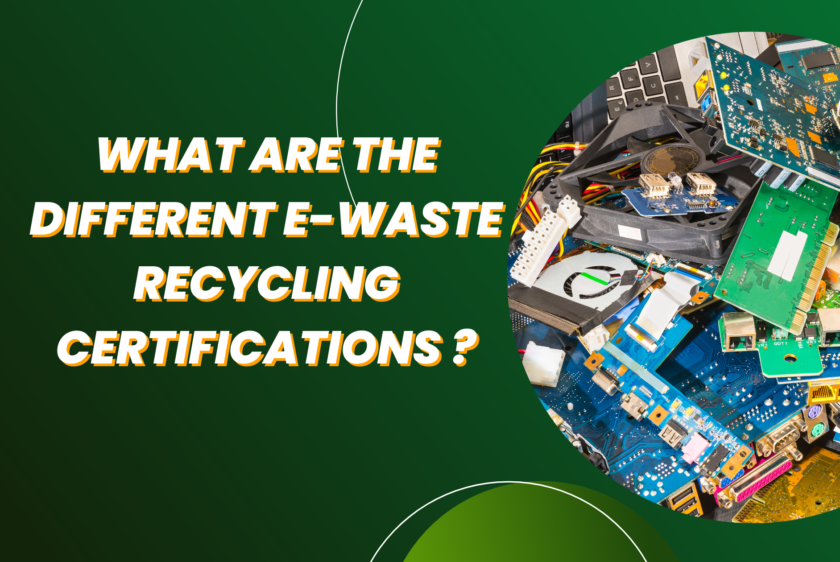
What Are The Different E-Waste Recycling Certifications And Standards?
As our dependence on electronic gadgets grows, so does the importance of responsible e-waste management. Electronic waste, or e-waste, poses a significant environmental threat if not properly handled. It is critical for individuals, businesses, and governments to prioritize recycling and proper disposal of electronic devices to mitigate these risks and ensure a sustainable future for all. E-waste recycling certifications play a pivotal role in promoting sustainable practices. In this blog post, we’ll share the various certifications that make e-waste management efficient.
Learn About Important E-waste recycling Certificates

1. R2 (Responsible Recycling) Certification:
R2, or Responsible Recycling, is a leading certification program developed by SERI (Sustainable Electronics Recycling International). This certificate focuses on responsible and sustainable practices throughout electronics recycling.
Key criteria include:
a. Environmental and Health & Safety Management: R2-certified facilities adhere to strict environmental management systems (EMS) and health and safety protocols to make sure the well-being of both workers and the environment.
b. Data Security: R2 certification emphasizes secure data destruction, mitigating the risk of sensitive information falling into the wrong hands during recycling.
c. Reuse and Recovery: Certified recyclers prioritize reusing electronic components and materials, reducing the overall environmental impact of e-waste.
2. e-Stewards Certification:
The e-Stewards Certification, managed by the Basel Action Network (BAN), is another notable standard in the e-waste recycling landscape. This Certification strongly emphasizes preventing the export of hazardous e-waste to developing countries.
Key criteria include:
a. Prohibition of Export: e-Stewards certified recyclers are strictly prohibited from exporting hazardous e-waste to countries with insufficient regulatory controls.
b. Environmental Responsibility: Certified facilities commit to rigorous environmental standards, including minimizing the release of hazardous substances and reducing overall environmental impact.
c. Social Responsibility: e-Stewards certification addresses social issues by ensuring that workers involved in the recycling process are treated fairly and that the surrounding communities are not adversely affected.
3. ISO 14001: Environmental Management System Certification:
ISO 14001 is a globally acknowledged certification that focuses on establishing and maintaining an effective Environmental Management System (EMS). This Certification is designed to help organizations minimize their environmental impact and achieve sustainability goals.
Key criteria include:
a. Legal Compliance: ISO 14001-certified organizations demonstrate adherence to applicable environmental laws and regulations and ensure that their operations are performed in compliance with environmental requirements.
b. Continuous Improvement: It encourages a commitment to continuous improvement in environmental performance, pushing organizations to identify and implement opportunities for reducing their ecological footprint.
c. Stakeholder Engagement: It places importance on engaging with stakeholders, including employees, suppliers, and the community, to foster a holistic approach to environmental responsibility.
4. National Association for Information Destruction (NAID) Certification:
NAID Certification, administered by the National Association for Information Destruction, is a recognized standard in the secure destruction industry. This Certification ensures that organizations handling sensitive information follow strict protocols to protect data privacy and security.
Key criteria include:
a. Secure Information Destruction: NAID-certified organizations implement secure processes for destructing confidential information to prevent unauthorized access or disclosure.
b. Employee Training and Screening: Certification requires organizations to conduct thorough employee training and screening to ensure that personnel handling sensitive information are trustworthy and capable of maintaining confidentiality.
c. Compliance with Data Protection Laws: NAID Certification involves compliance with relevant data protection laws, reinforcing the commitment to legal and ethical handling of sensitive information throughout its lifecycle.
Final Say!
As consumers, businesses, and governments become increasingly aware of the environmental implications of electronic waste, the demand for responsible recycling practices is on the rise. Choosing e-waste recyclers with recognized certifications and standards ensures the proper disposal of electronic devices and contributes to a more sustainable and circular economy model.
Read Our More Blogs:
How Do You Choose The Right E-Waste Management Partner For Your Business?
Benefits Of Choosing Certified E-Waste Recyclers For Your Business
Follow us:







